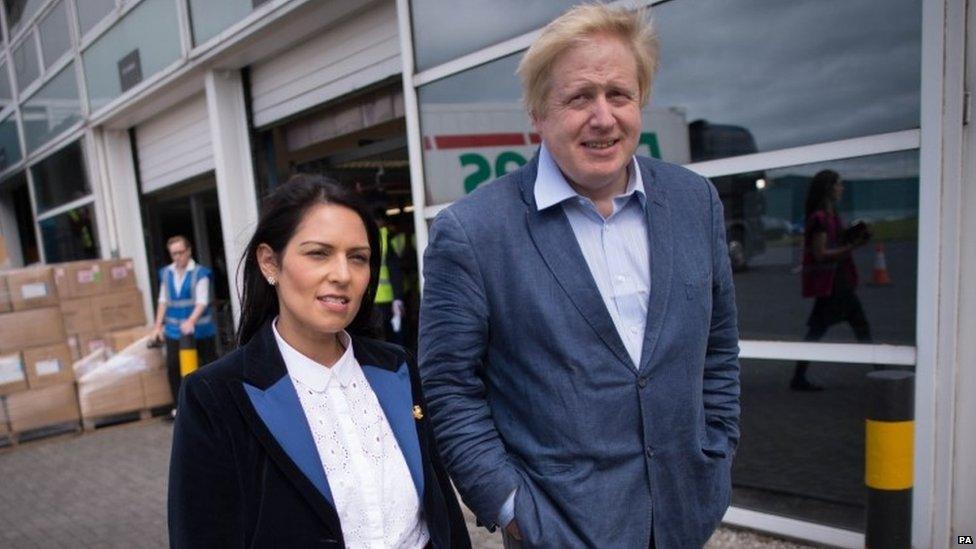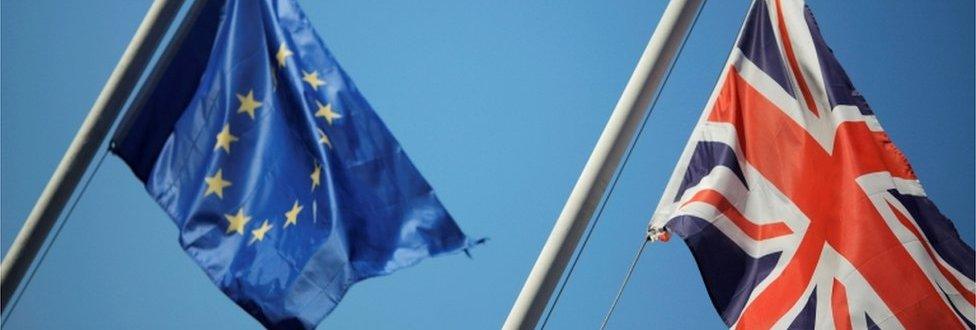Dutch PM's warning over Brexit 'fairer immigration' claim
- Published
- comments
Dutch PM Mark Rutte: "You would get a race to the bottom and that's exactly what you don't want"
A pledge to bring in a "fairer" points-based immigration system if the UK left the European Union has triggered a warning other countries would adopt the same approach towards British workers.
Vote Leave said ending EU citizens' automatic right to live in the UK would create a "more humane" system.
But Dutch PM Mark Rutte told the BBC it would trigger "an inevitable, unavoidable race to the bottom".
David Cameron said it would "crash" the economy and increase migration.
Britain currently has a points-based immigration system for people coming to work in the UK from outside the EU.
It means entry to work is limited to people deemed to be of value to the UK economy, such as skilled workers in "shortage occupations" or wealthy entrepreneurs and investors. Migrants with sought-after skills gain more points towards their visa. This is often called an Australian-style system as that country introduced it first.
More migrants come to the UK from outside the EU than inside it - but a higher number of EU migrants take jobs or look for work.

Analysis by Mark Easton, BBC home editor
Extending points-based controls to all migrants could be seen as fairer - South African software designers would have the same chance of working in Britain as Spanish software designers.
It would also give government more control of who and how many immigrants can come to the UK.
The problem is in designing a system that is not completely bound up in the kind of red tape the Leave campaign complains about in Brussels.
A government-commissioned employment report recently urged ministers to simplify the existing system for bringing workers from abroad, complaining there are 13 relevant acts of Parliament including 10,000 pages of guidance relating to 1,400 categories of immigrants. It noted that employers must answer over 100 questions including the birth dates of applicants' dead parents.
The system also relies on an army of officials having a detailed understanding of the current needs of every area of UK industry to decide if a shortage exists. The warning from business is that bureaucrats in Whitehall will be rather less efficient and responsive to need than the market.
Points-based systems were introduced by countries looking to increase immigration and to woo the right people to become permanent residents.

Leave campaigners want the points system to be extended to cover EU migrants, who are currently free to come to the UK and take up jobs, including low-paid manual work - but it would be up to the government of the day to decide whether to adopt this policy.
The Leave campaign says that if Britain votes to come out of the EU the government should do the following by 2020:
End the automatic right of all EU citizens to come to live and work in the UK
Those seeking entry for work or study should be admitted on the basis of their skills without discrimination on the ground of nationality
To gain the right to work, economic migrants will have to be suitable for the job in question
For relevant jobs, the UK will be able to ensure that all those who come have the ability to speak good English
EU citizens already lawfully resident in the UK would not be affected as they will be given indefinite leave to remain, and neither will Irish citizens.
The 1972 European Communities Act could also be amended to make it easier to remove criminals and other people whose presence in the UK is "not conducive to the public good".

Leave campaigners say the UK should have full control over who comes into the country
In a joint statement, Boris Johnson, Michael Gove, Priti Patel and Gisela Stuart said their proposals would "create fairness between EU citizens and others" including those from Commonwealth countries.
They added: "We think that this system will be fairer, more humane, and better for the economy."
"We will welcome new citizens who wish to contribute to our society, as so many immigrants have done. And we will be able to remove those who abuse our hospitality."
But Mr Rutte, whose country currently holds the presidency of the European Council, said it would be "very bad news" if the UK adopted such an approach.
"It will immediately mean that we will get this race to the bottom, that it will move against the interests of the population," he said.

Analysis, BBC political editor Laura Kuenssberg

Campaigns have got two choices as the date of any vote nears - narrow the message more and more tightly down to one issue, one argument, one sound bite or slogan. The logic of that is clear - focus on your best bits and shout about them as loudly as you can.
But there's a different way - keep adding to what might cringingly be called "the offer", in the hope that a slow reveal of ideas will gradually get voters on your side. Essentially, save the best until last.
After the entirely predictable economic bludgeoning of the Vote Leave campaign by the other side, which has all the might of the government machine, it's now clear that rather than try to retaliate with all of their goodies, Outers were keeping some in the cupboard for this moment.

Mr Rutte said it would be "impossible" for him not to implement a similar system towards UK residents.
Mr Cameron said this would "reduce opportunities for people to work in other countries". He told BBC Radio Derby that Australia had more migration per head than the UK, so Vote Leave's proposal was "the wrong approach".
His point was echoed by Home Secretary and fellow Remain supporter Theresa May, who warned there was "no silver bullet" to control immigration.
"What it requires is a concerted effort across a range of fronts and we've shown that where we take action, we can bring the numbers down, but there's more to do," she added.
'No easy choices'
But UKIP leader Nigel Farage, who has previously called for the UK to adopt an Australian-style system, said this was because Australia was "growing its country" and was able to choose migration numbers every year.
Deputy Labour leader Tom Watson accused Vote Leave of trying to turn the EU referendum into a vote on British immigration policy.
He said an EU exit "won't end immigration" and he cautioned that there were "no easy choices", saying losing access to the EU's single market would be bad for trade and against British workers' interests.
Meanwhile, the TUC is warning average earnings in Britain would be lower by 2030 outside the EU - adjusting wages for smaller GDP growth.
A study by the TUC also says employee rights and manufacturing jobs in particular would be hit.
TUC general secretary Frances O'Grady said: "At a time of continuing hardship, Brexit would be a disaster for working people - for our wages, for our jobs and for our rights."
But Vote Leave's Ms Stuart said the EU had been "a disaster" for workers, saying unemployment levels across the eurozone were "in the double digits".
Correction: This story, originally published on 1 June, has been amended to clarify that the majority of migrants coming to the UK for work are from the EU.